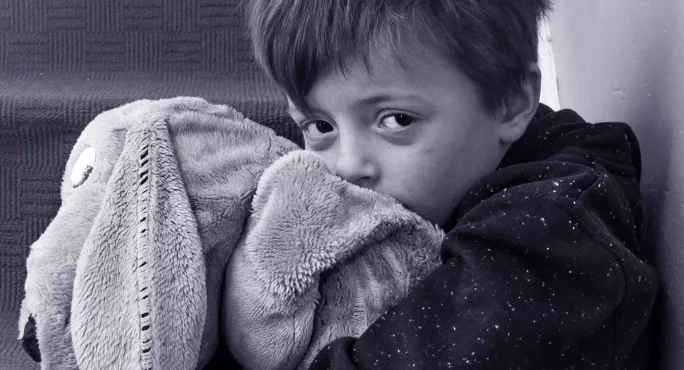- Home
- More and more schools are battling grinding pupil poverty
More and more schools are battling grinding pupil poverty

Whenever I meet groups of school and college leaders, I always ask them to tell me their main worry.
Nationally, it’s funding, teacher recruitment and retention, onerous accountability and concerns about children’s mental health. But this week, talking to the leaders of schools and colleges in some of the most deprived communities in the UK, I got a different response.
A long-standing secondary headteacher from Lancashire looked me in the eye and gave a two-word answer: “hungry children".
He described how his staff – against a backdrop of depleted social care, children’s mental health services, and an overstretched police force – started their day by making sure that children had eaten.
A head from Clacton described children coming from homes where tobacco, alcohol, and drugs were prioritised over food. He said: “Local policing no longer has the positive impact it used to have. Essex has dramatically reduced the number of PCSOs [police community support officers] on the beat who used to know families, and who provided support before things escalated. I used to have my own dedicated police officer based in my school under a government initiative – it was hugely beneficial. However, now there is not even a named police officer readily available to schools in Clacton.”
A head from Bridlington, North Yorkshire, said something similar: “Low aspirations among young people in coastal communities aren’t something that can be tackled by education services alone. All aspects of public service have a role to play. They certainly aren’t helped by the way schools are measured.”
And there’s the mismatch – how we measure schools where the biggest issue for staff is dealing day in and day out with the effects of grinding, relentless poverty.
Progress 8 may be better than the old measure of five GCSEs A*-C, but it is not perfect. What follows is not a popular argument in the corridors of the DfE, but here goes anyway.
The simple fact is that children from disadvantaged backgrounds often don’t make as much progress as other children. This isn’t because their teachers are necessarily any worse than those in other schools, or that they come from families that don’t care.
It’s because their parents may be working in two or three jobs to put food on the table, or they live in poor quality housing where it is difficult to focus on studying, or their families have been ground down by generational unemployment and insecure work, and their children simply don’t see the point of education.
It’s because they don’t enjoy the benefits that middle-class families – you and me – take for granted: the theatre trips, days out, music, drama, sports clubs, foreign travel, and all the other things that broaden horizons and enrich lives.
The result is that schools in areas of high disadvantage, where children make less progress, are much more likely to record low Progress 8 scores. And because we live in a high-stakes system, and because there is a strong relationship between Progress 8 scores and Ofsted ratings, that makes the position of headteacher more precarious in these schools.
Not only is this manifestly unfair, but it is incredibly wasteful and inefficient. Remember that these are individuals who have trained as teachers, worked in classrooms, become school leaders, and accumulated many years of experience. They have also learned a great deal about working in challenging environments. And then we get rid of them. All that experience and knowledge is lost to the system.
And it is also a deterrent to people stepping up into headship roles in the most deprived communities. These areas need great leaders who can operate with the confidence that their careers are not hanging by a thread.
So, what are the solutions?
1. No accountability system is ever going to be perfect. We recognise that. But we need the government and Ofsted to be less defensive and more open to the idea that the system is loaded against certain schools. Then we can jointly put in place a more nuanced narrative which helps to support those schools rather than stigmatising them.
2. We need governors and trusts not to over-react to a negative Ofsted judgement or poor Progress 8 score. Many governing bodies and trusts understand this already of course. But we also see examples where careers have been ended far too abruptly.
3. It’s a familiar refrain but we have to improve funding and teacher supply. There isn’t enough money in the system and it is making it difficult for schools to provide the extra support needed by the most vulnerable learners. Similarly, there aren’t enough teachers and the schools which most struggles with recruitment and retention are those in the most disadvantaged areas – especially when they have been stigmatised by the accountability system.
And finally, look again at those comments from the headteachers I quoted at the start of this article. What they tell us is this: schools and colleges cannot change life-chances on their own. They are important – often brilliant – agents of change. But we also need joined-up social and economic policies which restore hope to areas reeling under the never-ending hammer-blows of disadvantage.
Geoff Barton is general secretary of the Association of School and College Leaders
Register with Tes and you can read two free articles every month plus you'll have access to our range of award-winning newsletters.
Keep reading with our special offer!
You’ve reached your limit of free articles this month.
- Unlimited access to all Tes magazine content
- Save your favourite articles and gift them to your colleagues
- Exclusive subscriber-only stories
- Over 200,000 archived articles
- Unlimited access to all Tes magazine content
- Save your favourite articles and gift them to your colleagues
- Exclusive subscriber-only stories
- Over 200,000 archived articles



